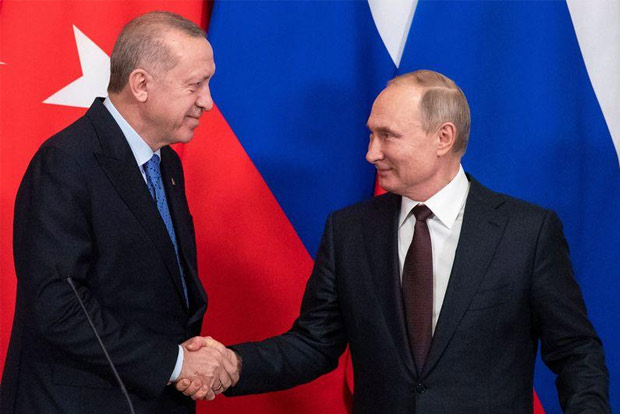(VOVWORLD) - Russian President Vladimir Putin and Turkish President Recep Tayyip Erdogan on Thursday agreed to a ceasefire in Syria’s Idlib province. The agreement reached during a one-day visit to Russia by the Turkish leader paves the way for ending military operations in Idlib and the humanitarian crisis in Syria.
|
 Russian President Vladimir Putin and Turkish President Tayyip Erdogan shake hands during a news conference following their talks in Moscow, Russia March 5, 2020. Russian President Vladimir Putin and Turkish President Tayyip Erdogan shake hands during a news conference following their talks in Moscow, Russia March 5, 2020.
(Photo: Reuters)
|
Before the deal was agreed, escalation of violence had been reported in Idlib . Russia and Turkey are on opposite sides of Syria’s civil war, with Russia supporting the Syrian government of Bashar al-Assad and Turkey backing anti-government fighters. Officials of the two countries had met 3 times face-to-face, but no solution to ease tension in Idlib had been reached.
Head-on confrontation avoided
Under the ceasefire which began at midnight on Thursday evening, the two countries will continue joint efforts to fight terrorism and settle the humanitarian crisis in Syria. Turkey’s military will have the right to respond if attacked by Syrian government forces, but will not control the Syrian territory. The agreement creates a “safety corridor” across Idlib, which Russian and Turkish forces will begin patrolling at the end of next week.
Idlib is the last stronghold controlled by Turkish-backed fighters. The Syrian army backed by the Russian air force launched an offensive in December last year to reoccupy major positions in Idlib, prompting Turkey to send troops there to maintain its influence on the region. On March 1, Turkey shot down 2 Syrian jet fighters in Idlib and conducted an air strike on a military airport that killed 19 Syrian soldiers. Turkey ramped up its military operations after dozens of its troops were killed in air strikes early last week. As of March 5, 57 Turkish troops have died.
Mounting confrontation between pro-Turkey fighters and the Syrian army worsened Moscow-Ankara relations. Russian jet fighters bombarded insurgents backed by Turkey. The UN condemned both Russia and Turkey for committing “war crimes” and triggering the biggest humanitarian crisis in the 9-year civil war in Syria. Ankara blamed Moscow for interfering in Syria. Moscow said it sent troops at the request of the Syrian government.
Syria’s war game
The fresh ceasefire shows that both Russia and Turkey both prefer to avoid a direct confrontation, because they have close trade and defense ties. Before President Erdogan’s visit to Russia, the Kremlin had signaled a willingness to cooperate with Ankara, which Moscow considers its number one partner. Turkey said they should not repeat mistakes made in 2015, when a Turkish F-16 jet fighter shot down a Russian Su-24 bomber. One reason for Ankara’s conciliatory gesture is that its request for help had been flatly rejected by Washington, who said the US will only support humanitarian activities in Idlib. European countries have been unhappy about Turkey opening its border for migrants to enter Europe.
A comprehensive solution to the conflict in Idlib will depend on the Syrian government, Russia, and Turkey. Syria wants to restore its territorial integrity, including Idlib. Russia seeks to consolidate its influence in the Middle East, while Turkey aims to prevent migrants from crossing its border and security threats from the Kurds.